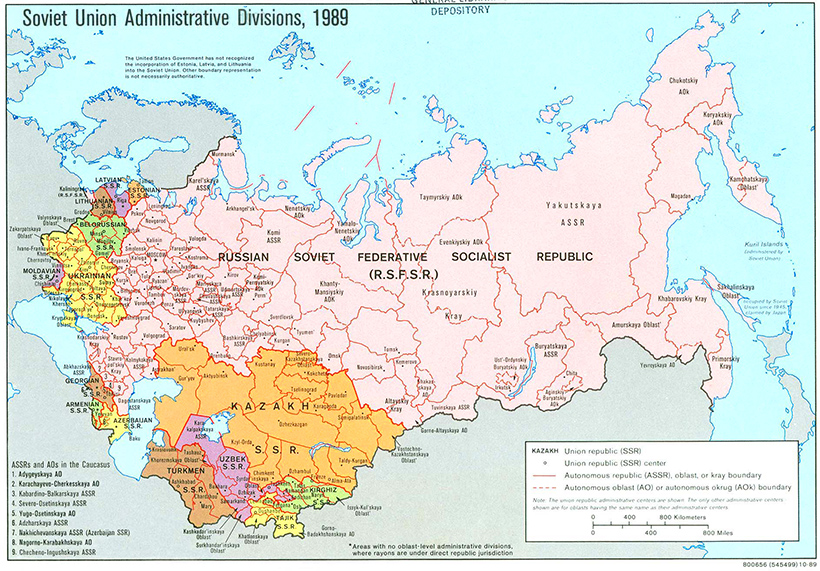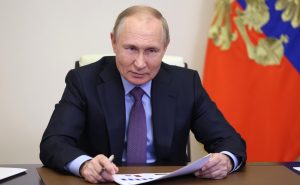Lately, I came across a very interesting article “The Roots of Russia”, written exactly sixty years ago by Dr. Lev Dobriansky (1918-2008), a renowned Professor of Economics at Georgetown University and former US Ambassador to The Bahamas[1]. Dobriansky’s article was re-published in January 1964, in An Cosantóir (The Defender), The Irish Defence Journal, courtesy of (US) Naval Institute Proceedings-April 1963. Now I learn from the former First Lady of Ukraine, Chicago-born Kateryna Yushchenko, that she studied and later served under Dobriansky when she headed the National Captive Nations Committee and the Ukrainian National Information Service in the USA.
Dobriansky was the US-born son of Ukrainian immigrants and a staunch anti-Communist. Amongst the nuggets that his article brings out, over a half-century ago, when Russia already dominated the USSR, which in turn dominated a good part of the world: Russians did not constitute a majority of the USSR, no more than Germans would in today’s EU. Even back in 1897, 60% of the subjects of the Russian Empire were not Russian. Lenin himself said, “Czarist Russia and the Russians constituted 43 percent of the total population, i.e. a minority, while the non-Russian nationalities constituted 57 percent”. Even the Soviet census of 1951 revealed that of 202 million, 54 percent were non-Russian (later denied by Beria).
Dobriansky pointed out specifically the “statistical tricks in padding figures for political purposes as, for example, counting a person as Russian because he knows the Russian language”. This underpins to this day the egregious and false invasion logic that Putin exerts on eastern Ukraine, including Crimea. Dobriansky also pointed out that the most productive lands were in non-Russian homelands, such as Ukraine, the Caucasus, and Central Asia. He adds, back in 1963, that “both Russian institutional totalitarianism and Russian imperialism have been fiercely resisted by the non-Russian nations in the USSR”.
In all of this, Ukraine, by virtue of its size, history, and capacities, is critical for freedom to flourish. It is critical to the fulfillment of the rights of all peoples in the former USSR space. In this regard, Ukraine’s struggle for normalisation as a free and independent European state is analogous to the struggle of the Irish (and Americans, Africans, Asians, etc.) from imperialist colonial rule. Curiously enough, Dobriansky, without using the term, recommended hybrid means using diplomatic, political, psychological, and cultural weapons, in favour of realising “the expansion of freedom in the world”, especially for “(1) real national self-determination and independence for all the non-Russian nations in the Soviet Union, (2) the advancement of decentralist Siberyak tendencies in the Asiatic sphere of the Russian Soviet Federative Socialist Republic itself, and (3) the hope of genuine freedom to countless innocent Russians in an attempt to create and broaden any discernible rift between the Moscow government and the underlying Russian masses.”
Since then, much has changed, the USSR dissolved, but Russia again seeks resurgently to dominate its neighborhood and intimidate the world. Putin’s greatest legacy is likely to be his destruction of Russia’s international credibility, and failure to enhance Russia’s standing in the world. Russia, once constructive in multilateralism, now undermines the instruments of international order required for human security in the 21st century. Putin’s behavior today is diametrically opposed to the values he apparently espoused twenty years ago in June 2003 in his address to the visiting InterAction Council of former world leaders[2]. Add to this domestically, his failure to widen the freedoms of Russians in civil society and the media, to decentralise power, liberalise society, advance democracy, transparency and accountability, and to diversify Russia’s economy on a sustainable basis.
Dobriansky also recalled how Krushchev, at the 20th Congress of the CPSU admitted that “Stalin had attempted to kill off 40 million Ukrainians and had failed“. For those who still think that Russia and Ukraine are brotherly nations, perhaps the parable of Cain and Abel tells it best.
Ergo, the future of European coherence largely depends on three critical factors today: (1) Russia’s ability to respect Ukraine’s sovereign choices and to restore itself to international and multilateral collaboration, and (2) the EU’s ability to maintain strategic unity and political heft, and (3) Germany’s ability to think “outside the box”, and with some modesty realise that in the wider EU, it is a minority nation, for there is no majority one, and it should therefore exert its influence more positively to build consensus around choices for European futures. Germany needs to let those Leopards roll now, as Ukraine is losing ground around Bakhmut, Berestove and Konstyantynivka, according to the Institute for The Study of War.
Even Russia would be a minority country, if and when it joins the EU (fat chance of that). As Romano Prodi said in 2003, the EU’s Europe is “a union of diversity and minorities”. That is our strength and our only future. This neighborhood no longer has any room for bullies.
The future of Russia lies in a transition back to reform and true democracy, but with complete withdrawal from Ukraine, war crimes trials, and reparations. Can Russia survive? – that is the bigger question. And at this stage of its moral, financial, political, and strategic decay, the question must be: why should it? It is after all a crony empire and should be stripped of veto power in the UN Security Council, and subject to de-colonisation under chapters XI, XII, and XIII of the UN Charter.
Putin’s Russia has continually violated the UN Charter, the Universal Declaration of Human Rights, the Geneva Conventions, and multiple UN General Assembly resolutions passed against its aggression in 2022. It has become a rogue criminal régime. Most importantly, Russia cannot legitimately veto any UN Security Council (UNSC) resolution on a dispute to which it is party, i.e. it cannot veto UNSC action on its invasion of Ukraine, according to UN Charter Article 27.3. It is time for the world to stop ignoring that prohibition or interpreting it so narrowly as to enable rogue impunity through global inertia.
While it has been argued that the obligation to abstain from exercising the veto under Article 27.3 only relates to Chapter VI and Art. 52. 3 of Chapter VIII, and not to Chapter VII of the UN Charter, it has to be equally argued that Russia did NOT respect Art. 33 of Chapter VI, neither prior to its aggression in 2014 nor since its invasion of Ukraine in February 2022; nor did it respect Art.37, i.e. it did not seek peaceful resolution for its alleged “grievances” through recourse to the international instruments established to prevent violent conflict, and indeed the scourge of war. The UN Security Council also failed to refer the dispute to a regional mechanism, such as the OSCE, under Art 5. of Chapter VIII of the UN Charter. By the way, despite the huge increase in member states through decolonization and later dissolution of the USSR, the UN Charter (let alone the Security Council) has not been revised since 1971. Hence, Art. 27.3 should be re-interpreted without holding world peace hostage to a formal UN Charter amendment and comprehensive UN reform.[3] It is not like other UN Charter articles have not been reinterpreted to allow for adjustment to changed circumstances, including Art. 23.1 which still mentions “the Union of Soviet Socialist Republics” as one of five permanent members of the Security Council but Russia occupies the seat with broad consent after the dissolution of the USSR.
The failure to institutionalize and mainstream such civic education values, norms, and curricula, driving their adherents into exile instead, has deprived Russia of the critical mass of civic empowerment that would have rendered its leaders truly democratically and judicially accountable and served as a check on totalitarianism. Contrary to the appeasing arguments advanced by writers such as Geoffrey Roberts in The Irish Times[7], it is such internal failures of governance that have brought the world to the precipitous chasm we face, not Western aid to a free nation, Ukraine, under unjustified aggression by its former imperial overlord.
It is now up to the world to disempower this rogue state and return it to compliance with its international obligations, which are incumbent on us all, without exception.
Ukrainians deserve nothing less – and the same goes for the diverse peoples of Russia, and the rest of the world.
[1] O’Donnell, F. M. Dobriansky, the non-Russian centrifuge, and a union of diversity and minorities, Academia, 17 June 2015. https://www.academia.edu/13049866/Dobriansky_the_non_Russian_centrifuge_and_a_union_of_diversity_and_minorities_
[2] Putin, V. V. Address to the InterAction Council, 23 June 2003 http://www.en.kremlin.ru/events/president/transcripts/22033
[3] Comprehensive UN reform, including the Charter amendment, is definitely needed, as made evident once again by the inability of the world organization to address effectively the Russian invasion of Ukraine but also global risks of a non-military nature, like the COVID-19 pandemic and climate change. The process of reform initiated by Secretary-General António Guterres’ report Our Common Agenda (2021) will culminate through a number of milestones in a Summit of the Future in September 2024. It is an opportunity that should not be missed to keep the United Nations relevant and useful for humanity in the decades to come.
[4] Chyzh, Olga. When will Putin give up Ukraine? Only when his inner circle forces him to stop. The Guardian, 22 January 2023 https://www.theguardian.com/commentisfree/2023/jan/22/vladimir-putin-ukraine-west-russia-president
[5] Snyder, Timothy. Judenplatz 1010 – A Speech to Europe, sponsored by Erste Foundation and the Institute for Human Sciences (IWM), 9 May 2019. https://www.youtube.com/watch?v=7zs41CkIjRw
[6] Applebaum, Anne. The Russian Empire Must Die, The Atlantic, December 2022. https://www.theatlantic.com/magazine/archive/2022/12/putin-russia-must-lose-ukraine-war-imperial-future/671891/
[7] Roberts, Geoffrey. West risks war with Russia over escalating military aid, Irish Times, 25 January 2023 https://www.irishtimes.com/opinion/2023/01/25/germans-are-right-to-think-twice-about-sending-leopard-tanks-to-ukraine/




